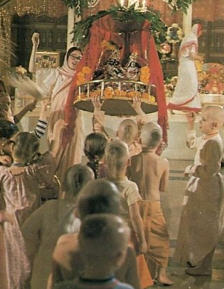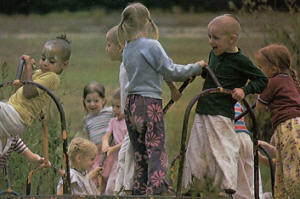A Public School Teachers Takes a Look at Gurukula
Gurukula, in Dallas, Texas, is a school unlike any other in America. At a time when this country's schools are receiving much criticism, the alternative methods of Gurukula are attracting attention. A public school teacher comments on Gurukula in a talk with BTG's senior editor, Satsvarupa dasa Gosvami.
Anthony Stachursk has been teaching for nine years in Michigan in elementary, junior high and high schools.

Satsvarupa: What do you think of the discipline at Gurukula, compared with that in the public schools?

Mr. Stachursk: There's a great deal of dissatisfaction among both teachers and parents with today's public schools. Up until recently, there hadn't been enough discipline, but responsible parents demanded it, and now things are going in the opposite direction away from permissiveness. In our school we have three teachers constantly prowling the cafeteria, yet it's still bedlam. The difficulty is that there's no accepted idea of what to do with a misbehaving child. Besides, attempts at discipline are useless it they are not backed up with exemplary behavior by the teachers. Too many teachers are simply concerned with what they'll do on vacation and how they'll save on income tax not with the welfare of the students.
Somehow these problems don't exist at Gurukula. For example, all the children even the four- and five-year olds sit in the dining hall at Gurukula and eat with self-control. They don't throw their food around or perform other antics you commonly see in public schools. And the teachers are completely dedicated: they spend practically all their time with the children. In the public schools the motivation is mostly money. There's very little inspiration.
Satsvarupa: What is your feeling about spiritual instruction for young children?
Mr. Stachursk: Well, when I first became interested in Gurukula, I was what you'd call an atheist. I was teaching in a public school at that time, and I came to the conclusion that the public schools don't care whether the child is religious or atheistic: they simply don't want the issue brought up in the classroom. For example, a book I was teaching from said that life comes about by evolution, and I was criticized for teaching atheism. Later another teacher was criticized for reprimanding a child who took God's name in vain. They simply want you to give the information and not give any opinions.
At Gurukula spiritual instruction is given, but it's based on reason, and it's given with love by people who are actually leading an exemplary life. Whatever imperfections there may be in Gurukula can be worked out. As far as lack of facilities is concerned, whatever lack they have is only due to a shortage of money. But the public schools cannot be changed, no matter how much money they have, because they lack a spiritual foundation.
Satsvarupa: What do you think these Gurukula children can do for the United States when they grow up?
Mr. Stachursk: I'm sure they can serve society in a variety of ways, either as full-time devotees giving spiritual instruction, or in some other capacity. In any case, spiritual education should be encouraged. What's perfect about it is the positive direction. What's the point of education in the public schools? The cities pour so much money into the buildings and systems, but what is the sense of having a Cadillac if it is going in the wrong direction? I find that the teachers in the public schools are lost souls. They have no philosophy, and they admit it. Gurukula is just the opposite. It's a school with purpose and hope.
